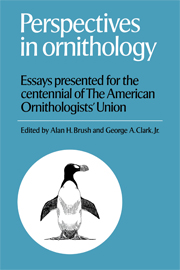 Perspectives in Ornithology
Perspectives in Ornithology Published online by Cambridge University Press: 04 August 2010
Optimal foraging theory (OFT) is one of the few areas of study in behavior and ecology in which mathematical models derived from first principles have been seriously tested in the laboratory and field. The balance between theory and data has remained good, unlike, for example, the field of community ecology in the 1960s and 1970s, where arcane models of baroque complexity were generally matched only with qualitative and unconvincing tests. Part of the success of OFT lies in the fact that although ecological in origin, the models have been tested with both ecological methods and the methods developed by ethologists and comparative psychologists (Pyke et al. 1977; Krebs 1978, Staddon 1980; Hughes and Townsend 1981; Kamil and Yoerg 1982). In 1966, the first two papers published on OFT (MacArthur and Pianka 1966; Emlen 1966) amounted to 0.5% of the articles in American Naturalist, Ecology, Journal of Animal Ecology, and Animal Behavior. The proportion of papers on OFT in just these journals had quadrupled to 2% by 1974 and to 8% in 1981.
In this chapter, we will start with a brief general comment on optimal foraging theory, then we review the evidence relating to “classical” foraging models. This is followed by two more detailed discussions; the first considers the relationship between classical models and two more recent developments, models of “rules of thumb” and stochastic models, and the second looks at some implications of the traditional models for population interactions of predators and prey.
To save this book to your Kindle, first ensure no-reply@cambridge.org is added to your Approved Personal Document E-mail List under your Personal Document Settings on the Manage Your Content and Devices page of your Amazon account. Then enter the ‘name’ part of your Kindle email address below. Find out more about saving to your Kindle.
Note you can select to save to either the @free.kindle.com or @kindle.com variations. ‘@free.kindle.com’ emails are free but can only be saved to your device when it is connected to wi-fi. ‘@kindle.com’ emails can be delivered even when you are not connected to wi-fi, but note that service fees apply.
Find out more about the Kindle Personal Document Service.
To save content items to your account, please confirm that you agree to abide by our usage policies. If this is the first time you use this feature, you will be asked to authorise Cambridge Core to connect with your account. Find out more about saving content to Dropbox.
To save content items to your account, please confirm that you agree to abide by our usage policies. If this is the first time you use this feature, you will be asked to authorise Cambridge Core to connect with your account. Find out more about saving content to Google Drive.